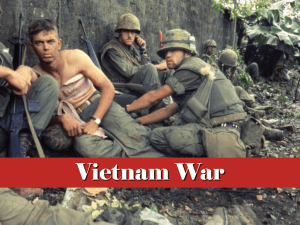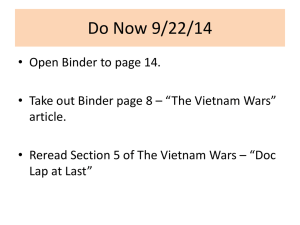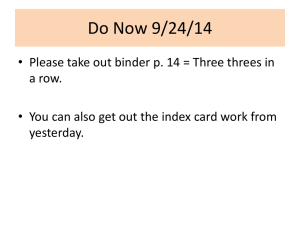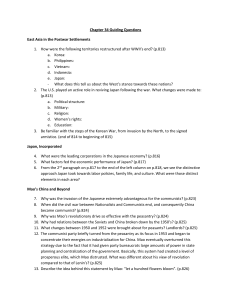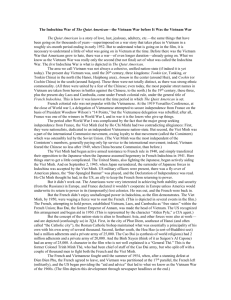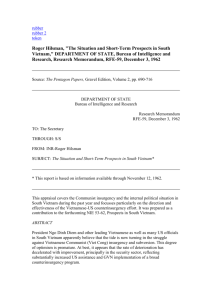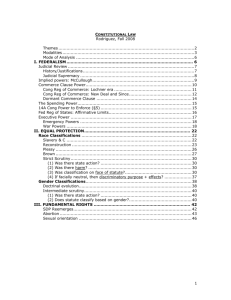Secretary of Defense, Robert McNamara, Memorandum for the
advertisement
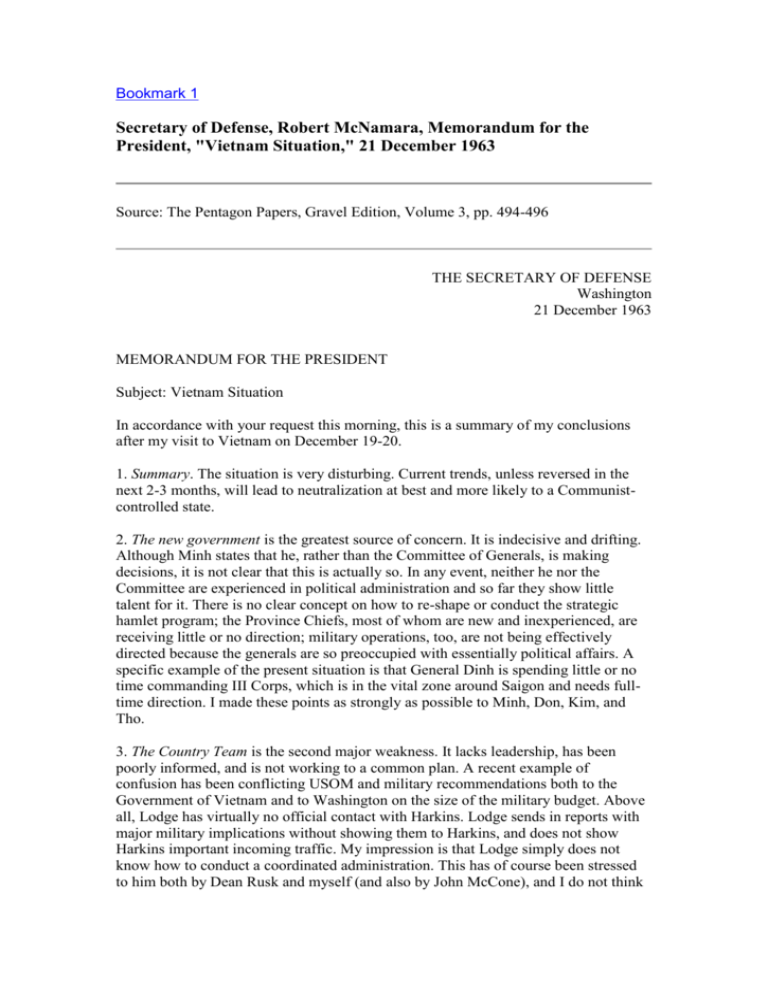
Bookmark 1 Secretary of Defense, Robert McNamara, Memorandum for the President, "Vietnam Situation," 21 December 1963 Source: The Pentagon Papers, Gravel Edition, Volume 3, pp. 494-496 THE SECRETARY OF DEFENSE Washington 21 December 1963 MEMORANDUM FOR THE PRESIDENT Subject: Vietnam Situation In accordance with your request this morning, this is a summary of my conclusions after my visit to Vietnam on December 19-20. 1. Summary. The situation is very disturbing. Current trends, unless reversed in the next 2-3 months, will lead to neutralization at best and more likely to a Communistcontrolled state. 2. The new government is the greatest source of concern. It is indecisive and drifting. Although Minh states that he, rather than the Committee of Generals, is making decisions, it is not clear that this is actually so. In any event, neither he nor the Committee are experienced in political administration and so far they show little talent for it. There is no clear concept on how to re-shape or conduct the strategic hamlet program; the Province Chiefs, most of whom are new and inexperienced, are receiving little or no direction; military operations, too, are not being effectively directed because the generals are so preoccupied with essentially political affairs. A specific example of the present situation is that General Dinh is spending little or no time commanding III Corps, which is in the vital zone around Saigon and needs fulltime direction. I made these points as strongly as possible to Minh, Don, Kim, and Tho. 3. The Country Team is the second major weakness. It lacks leadership, has been poorly informed, and is not working to a common plan. A recent example of confusion has been conflicting USOM and military recommendations both to the Government of Vietnam and to Washington on the size of the military budget. Above all, Lodge has virtually no official contact with Harkins. Lodge sends in reports with major military implications without showing them to Harkins, and does not show Harkins important incoming traffic. My impression is that Lodge simply does not know how to conduct a coordinated administration. This has of course been stressed to him both by Dean Rusk and myself (and also by John McCone), and I do not think he is consciously rejecting our advice; he has just operated as a loner all his life and cannot readily change now. Lodge's newly-designated deputy, Davis Nes, was with us and seems a highly competent team player. I have stated the situation frankly to him and he has said he would do all he could to constitute what would in effect be an executive committee operating below the level of the Ambassador. As to the grave reporting weakness, both Defense and CIA must take major steps to improve this. John McCone and I have discussed it and are acting vigorously in our respective spheres. 4. Viet Cong progress has been great during the period since the coup, with my best guess being that the situation has in fact been deteriorating in the countryside since July to a far greater extent than we realized because of our undue dependence on distorted Vietnamese reporting. The Viet Cong now control very high proportions of the people in certain key provinces, particularly those directly south and west of Saigon. The Strategic Hamlet Program was seriously over-extended in these provinces, and the Viet Cong has been able to destroy many hamlets, while others have been abandoned or in some cases betrayed or pillaged by the government's own Self Defense Corps. In these key provinces, the Viet Cong have destroyed almost all major roads, and are collecting taxes at will. As remedial measures, we must get the government to re-allocate its military forces so that its effective strength in these provinces is essentially doubled. We also need to have major increases in both military and USOM staffs, to sizes that will give us a reliable, independent U.S. appraisal of the status of operations. Thirdly, realistic pacification plans must be prepared, allocating adequate time to secure the remaining government-controlled areas and work out from there. This gloomy picture prevails predominantly in the provinces around the capital and in the Delta. Action to accomplish each of these objectives was started while we were in Saigon. The situation in the northern and central areas is considerably better, and does not seem to have deteriorated substantially in recent months. General Harkins still hopes these areas may be made reasonably secure by the latter half of next year. In the gloomy southern picture, an exception to the trend of Viet Cong success may be provided by the possible adherence to the government of the Cao Dai and Hoa Hao sects, which total three million people and control key areas along the Cambodian border. The Hoa Hao have already made some sort of agreement, and the Cao Dai are expected to do so at the end of this month. However, it is not clear that their influence will be more than neutralized by these agreements, or that they will in fact really pitch in on the government's side. 5. Infiltration of men and equipment from North Vietnam continues using (a) land corridors through Laos and Cambodia; (b) the Mekong River waterways from Cambodia; (c) some possible entry from the sea and the tip of the Delta. The best guess is that 1000-1500 Viet Cong cadres entered South Vietnam from Laos in the first nine months of 1963. The Mekong route (and also the possible sea entry) is apparently used for heavier weapons and ammunition and raw materials which have been turning up in increasing numbers in the south and of which we have captured a few shipments. To counter this infiltration, we reviewed in Saigon various plans providing for crossborder operations into Laos. On the scale proposed, I am quite clear that these would not be politically acceptable or even militarily effective. Our first need would be immediate U-2 mapping of the whole Laos and Cambodian border, and this we are preparing on an urgent basis. One other step we can take is to expand the existing limited but remarkably effective operations on the Laos side, the so-called Operation HARDNOSE, so that it at least provides reasonable intelligence on movements all the way along the Laos corridor; plans to expand this will be prepared and presented for approval in about two weeks. As to the waterways, the military plans presented in Saigon were unsatisfactory, and a special naval team is being sent at once from Honolulu to determine what more can be done. The whole waterway system is so vast, however, that effective policing may be impossible. In general, the infiltration problem, while serious and annoying, is a lower priority than the key problems discussed earlier. However, we should do what we can to reduce it. 6. Plans for Covert Action into North Vietnam were prepared as we had requested and were an excellent job. They present a wide variety of sabotage and psychological operations against North Vietnam from which I believe we should aim to select those that provide maximum pressure with minimum risk. In accordance with your direction at the meeting, General Krulak of the JCS is chairing a group that will lay out a program in the next ten days for your consideration. 7. Possible neutralization of Vietnam is strongly opposed by Minh, and our attitude is somewhat suspect because of editorials by the New York Times and mention by Walter Lippmann and others. We reassured them as strongly as possible on this-and in somewhat more general terms on the neutralization of Cambodia. I recommend that you convey to Minh a Presidential message for the New Year that would repeat our position in the strongest possible terms and would also be a vehicle to stress the necessity of strong central direction by the government and specifically by Minh himself. 8. U.S. resources and personnel cannot usefully be substantially increased. I have directed a modest artillery supplement, and also the provision of uniforms for the Self Defense Corps, which is the most exposed force and suffers from low morale. Of greater potential significance, I have directed the Military Departments to review urgently the quality of the people we are sending to Vietnam. It seems to have fallen off considerably from the high standards applied in the original selections in 1962, and the JCS fully agree with me that we must have our best men there. Conclusion. My appraisal may be overly pessimistic. Lodge, Harkins, and Minh would probably agree with me on specific points, but feel that January should see significant improvement. We should watch the situation very carefully, running scared, hoping for the best, but preparing for more forceful moves if the situation does not show early signs of improvement. Robert S. McNamara Return to Vinnie's Home Page Return to Vietnam War Page

![vietnam[1].](http://s2.studylib.net/store/data/005329784_1-42b2e9fc4f7c73463c31fd4de82c4fa3-300x300.png)
